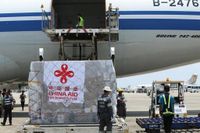On April 20, 2025, the humanitarian crisis in Myanmar deepened as the United Nations and various organizations ramped up their efforts to assist millions affected by devastating floods. The floods, which have wreaked havoc across the country, have left over 3.7 million people in dire need of aid, with at least 120 reported dead and many more unaccounted for.
In a significant show of solidarity, the Chinese government delivered its seventh batch of emergency humanitarian aid to Myanmar, arriving at Yangon International Airport. This shipment included a staggering 95 tons of essential medical supplies, such as 800,000 capsules of amoxicillin, 122,000 bottles of paracetamol and mannitol, 225,000 capsules of cefazolin, and 480,000 tablets of ibuprofen. The total value of this aid package is estimated at 950,000 yuan, demonstrating China's commitment to supporting its neighbor during this crisis.
UNICEF has been particularly vocal about the plight of children and women in the aftermath of the floods. They estimate that around 6.3 million people require urgent assistance and protection, especially in evacuation centers where access to clean water and sanitation is severely limited. The organization continues to coordinate with national authorities to improve the situation on the ground.
Meanwhile, the Sahapattanapibul group has also stepped up its efforts to provide relief. Collaborating with three ministries, including the Ministry of the Interior, they have committed 11 million baht worth of aid to help alleviate the suffering of disaster victims. This aid is set to reach people across 63 provinces affected by the floods, with special attention given to the 18 provinces that suffered the most damage, including Bangkok, which has been hit hardest.
Wichai Kulsomphop, the CEO of Sahapattanapibul, expressed his concern over the extensive damage caused by the floods, stating, "The earthquake on March 28 caused severe destruction across 18 provinces, including Bangkok, which experienced the most damage, resulting in numerous deaths and injuries." He emphasized the importance of their collaboration with various ministries to ensure that aid is delivered efficiently.
The aid distribution plan includes 5 million baht worth of products to assist Myanmar's citizens who are facing hardships due to the disaster, another 5 million baht for residents in northern Thailand and other affected areas, and 1 million baht specifically for workers impacted by the floods.
In a heartfelt gesture, Wichai noted, "Sahapattanapibul has factories in Myanmar, and upon learning of the earthquake, we halted production to assess the damage and donated all available stock to those affected in Myanmar." This initiative reflects the deep-rooted commitment of the company to support both Thai and Myanmar citizens in times of crisis.
As the situation continues to evolve, the Myanmar military has reported that the floods have resulted in over 3,700 deaths, with many individuals still missing. The ongoing crisis has raised significant concerns about public health, particularly as many people are still living outdoors, facing harsh conditions that could exacerbate health issues.
In light of these challenges, the international community has been urged to provide ongoing support. UNICEF has highlighted the urgent need for continued assistance, particularly for vulnerable populations such as children and pregnant women, who face heightened risks of health complications due to the extreme conditions.
As the floodwaters begin to recede, the focus shifts to recovery and rebuilding efforts. The government of Myanmar, alongside international organizations, is working tirelessly to restore basic services and ensure that affected communities receive the help they need to rebuild their lives.
In addition to the immediate relief efforts, long-term strategies are being discussed to mitigate the impact of future disasters. This includes improving infrastructure, enhancing disaster response capabilities, and ensuring that communities are better prepared for such emergencies.
As the situation develops, the solidarity shown by neighboring countries and international organizations serves as a beacon of hope for those affected by the floods. The collective efforts of governments, NGOs, and private sectors demonstrate the strength of human compassion in the face of adversity.
With continued support and collaboration, there is hope that the people of Myanmar will not only recover from this disaster but also emerge stronger and more resilient in the future.







